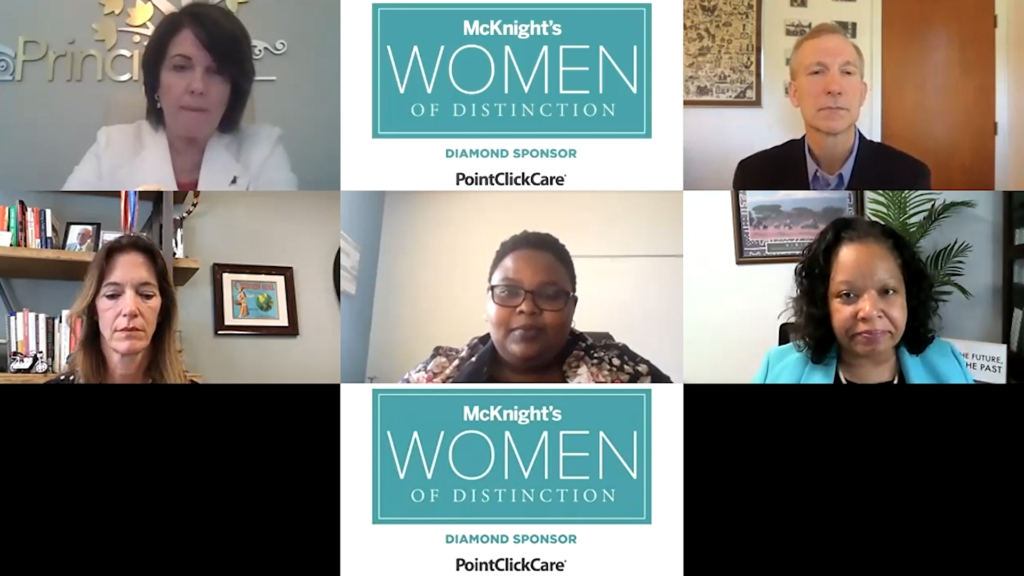

Running a nursing home during the pandemic, especially in its frightening and exhausting early months, may have left some leaders feeling they were trying to fix the engine while flying.
But a panel of female executives told McKnight’s this month that the unrelenting challenges had strengthened the resolve of many, proving both the industry and its increasing slate of women leaders are poised for great things to come.
“Nursing homes have always been seen as sort of the lower end of the healthcare spectrum,” said Lynn Hood, CEO and president of North Carolina-based Principle LTC. “We proved this past year how agile, resilient, how innovative we’ve been.”
Hood was one of four participants in a Women of Distinction Roundtable discussion sponsored by PointClickCare and moderated by McKnight’s Long-Term Care News Executive Editor James M. Berklan. Panelists discussed their challenges and successes during the pandemic, embracing diversity and mentoring young leaders.
Building a pre-pandemic team that was able to pivot — while remaining pragmatic and flexible — was an operational boon once COVID-19 hit, said Denise Chadwick Wright, CEO of Birmingham Green, a skilled nursing and assisted living community in Manassas, VA. Her facilities had reorganized their leadership structure, which helped speed up decision-making processes in the months to come.
“The COVID pandemic has really been like a rebirth, a new mindset,” Chadwick Wright said. “When we think about leadership, it’s a journey: Doing the right thing centered on values, on culture, setting people up for success and creating clarity around purpose as well as desired outcomes.”
Embracing COVID-era lessons
Hood said the drive for outcomes led Principle to pursue innovation, including a clinical testing partnership with monoclonal antibodies maker Eli Lilly, that she might not have considered pre-COVID. For Josy Dusabe, director of clinical excellence for Pittsburgh-based Vincentian and its three skilled nursing centers and two personal care homes, the pandemic underscored the need for communication with residents, staff and families.
“Corporate leadership came together to support all the staff, the administrators or the DONs … to actually interpret all the (local and federal) guidance and turn it into policies and use evidence-based practices,” Dusabe said. “We had that already, but it came to light.”
Armed with easy-to-explain policies from reliable sources, Vincentian was able to then empower staff to act and share strategies with concerned families.
The speakers encouraged other providers to build networks within their communities, whether those be with research facilities or scientific businesses, local health departments or medical directors from unaffiliated healthcare settings.
Among the COVID regrets panelists shared: not rolling out telehealth earlier; not having a specific, infectious disease preparedness plan; and not encouraging vacation early on. Vassar Byrd, CEO of Rose Villa life plan community, said she would have definitely allowed vacations at the pandemic’s onset had she known how long it would last and how serious a threat burnout would become.
Empowering the next generation
Empowering women and other minorities was a key focus for the speakers, several of whom have spent decades in long-term care.
Byrd said residents at her Portland, OR, community have their own “I Dream” committee and hold regular Black Lives Matter protests. In keeping with that theme, the community offers educational “Ted Talk”-style presentations to staff on revolving equity issues and as a Diversity, Equity, Inclusion and Accessibility team that champions diversity efforts and encourages promotions from within. A new requirement for all managers is to complete “plain language” training to help break down communication barriers.
Speakers emphasized the need for role models, as well as sustained mentoring relationships that encourage other women to stay in the industry. Hood, a former executive with HCR ManorCare, encouraged women to “understand their environment,” and if it isn’t supportive of advancing women, cut their losses to pursue employers who embrace female leaders’ value in the caregiving world.
“You just need to be yourself, and not make yourself smaller for any reason,” advised Byrd. “You get to be aggressive and kind. You can be competitive and transparent. You can be assertive and team-oriented. You get to be who you are and stand your ground. Be the best you can be.”
The McKnight’s Women of Distinction program is jointly administered by McKnight’s Long-Term Care News and McKnight’s Senior Living. The program’s Diamond sponsor is PointClickCare, and the Roundtable Sponsor is Paycor.




